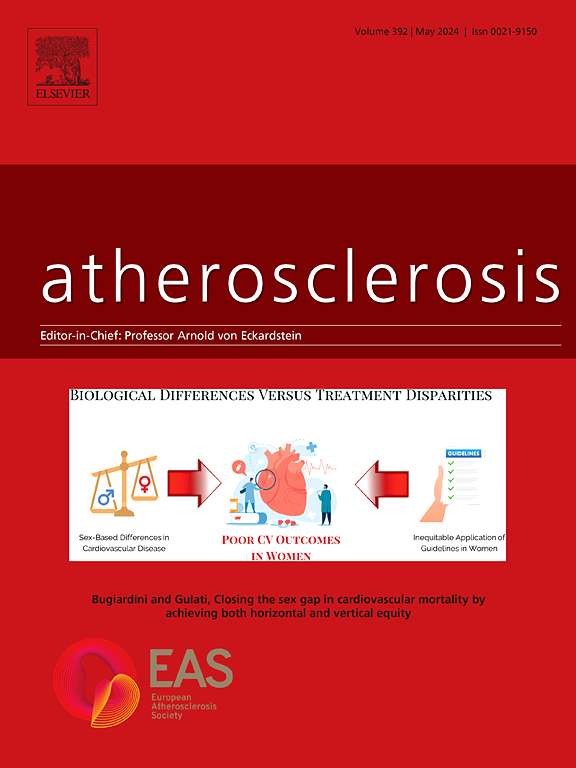Oral microbiome alpha diversity and all-cause, cardiovascular, and non-cardiovascular mortality in US adults: Evidence from the NHANES 2009–2019
IF 4.9
2区 医学
Q1 CARDIAC & CARDIOVASCULAR SYSTEMS
引用次数: 0
Abstract
Background and aims
Knowledge about the association between oral microbiome diversity within individuals and cardiovascular disease (CVD) and non-CVD mortality is scarce. Besides, variation by sex and racial and ethnic groups, and the potential mediators of these associations remain unclear. We aimed to investigate the associations of oral microbiome alpha diversity with all-cause, CVD, and non-CVD mortality, and the interaction effects of sex and racial and ethnic groups and potential mediators in the associations.
Methods
The National Health and Nutrition Examination Survey (NHANES) is a population-based observational study, conducted periodically in Mexican American, Other Hispanic, Non-Hispanic (NH) White, NH Black, and other racial/ethnic participants. We linked 2009-12 survey data of 8199 adults to the mortality data until 2019. By analyzing RNA gene sequences from oral rinse samples, microbiome alpha diversity within individuals was assessed using operational taxonomic unit (OTU) richness. Potential mediators included obesity, diabetes mellitus, dyslipidemia, hypertension, and periodontitis. Multivariable Cox proportional hazards regression and causal mediation analysis were used.
Results
Baseline mean ± standard deviation (SD) age was 42.1 ± 15.1 years. Over a median follow-up of 9.1 years, 405 all-cause mortality occurred (CVD, 105; non-CVD, 300). Each 1-SD increment in OTU richness was inversely associated with all-cause mortality (hazard ratio [HR] 0.92, 95 % confidence interval [CI] 0.90–0.95), CVD mortality (HR, 0.92; 95 % CI, 0.90–0.95), and non-CVD mortality (HR, 0.92; 95 % CI, 0.90–0.95). With evidence of significant racial and ethnic groups-interaction (p <0.05), these associations were evident in Mexican American, NH White, and others racial/ethnic participants. None of the potential mediators significantly mediated the associations of OTU richness with all-cause, CVD, and non-CVD mortality.
Conclusions
Lower oral microbiome alpha diversity is associated with higher risk for all-cause, CVD, and non-CVD mortality, and the associations are varied by racial and ethnic groups.

美国成年人口腔微生物组α多样性与全因、心血管和非心血管死亡率:来自NHANES 2009-2019的证据
背景和目的:关于个体口腔微生物群多样性与心血管疾病(CVD)和非CVD死亡率之间关系的知识很少。此外,性别、种族和民族群体的差异,以及这些关联的潜在中介因素仍不清楚。我们的目的是调查口腔微生物组α多样性与全因死亡率、心血管疾病死亡率和非心血管疾病死亡率的关系,以及性别、种族和民族群体的相互作用,以及这些关系中的潜在介质。方法:国家健康和营养检查调查(NHANES)是一项基于人群的观察性研究,定期在墨西哥裔美国人、其他西班牙裔、非西班牙裔白人、NH黑人和其他种族/民族参与者中进行。我们将2009-12年8199名成年人的调查数据与2019年之前的死亡率数据联系起来。通过分析口腔冲洗液样本的RNA基因序列,利用操作分类单位(OTU)丰富度评估个体内微生物组α多样性。潜在的介质包括肥胖、糖尿病、血脂异常、高血压和牙周炎。采用多变量Cox比例风险回归和因果中介分析。结果:基线平均±标准差(SD)年龄为42.1±15.1岁。在中位随访9.1年期间,发生405例全因死亡(CVD, 105例;non-CVD, 300)。OTU丰富度每增加1-SD,与全因死亡率(风险比[HR] 0.92, 95%可信区间[CI] 0.90-0.95)、心血管疾病死亡率(HR, 0.92;95% CI, 0.90-0.95)和非心血管疾病死亡率(HR, 0.92;95% ci, 0.90-0.95)。结论:较低的口腔微生物组α多样性与全因、心血管疾病和非心血管疾病死亡率的高风险相关,并且这种相关性因种族和民族而异。
本文章由计算机程序翻译,如有差异,请以英文原文为准。
求助全文
约1分钟内获得全文
求助全文
来源期刊

Atherosclerosis
医学-外周血管病
CiteScore
9.80
自引率
3.80%
发文量
1269
审稿时长
36 days
期刊介绍:
Atherosclerosis has an open access mirror journal Atherosclerosis: X, sharing the same aims and scope, editorial team, submission system and rigorous peer review.
Atherosclerosis brings together, from all sources, papers concerned with investigation on atherosclerosis, its risk factors and clinical manifestations. Atherosclerosis covers basic and translational, clinical and population research approaches to arterial and vascular biology and disease, as well as their risk factors including: disturbances of lipid and lipoprotein metabolism, diabetes and hypertension, thrombosis, and inflammation. The Editors are interested in original or review papers dealing with the pathogenesis, environmental, genetic and epigenetic basis, diagnosis or treatment of atherosclerosis and related diseases as well as their risk factors.
 求助内容:
求助内容: 应助结果提醒方式:
应助结果提醒方式:


